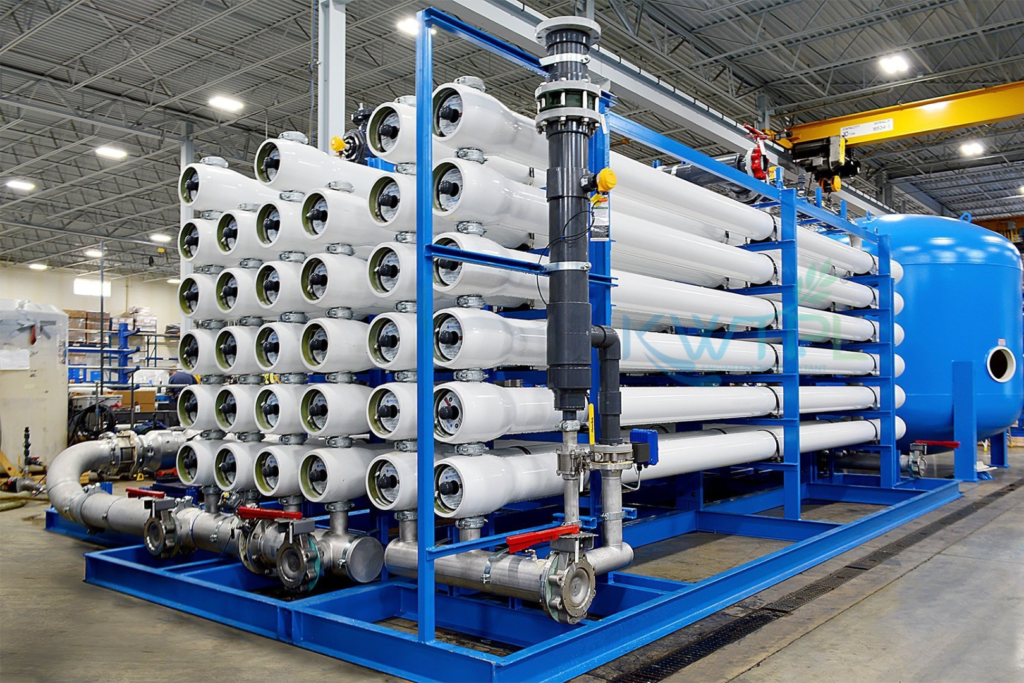Reverse Osmosis Systems in Industrial Processes

Reverse osmosis (RO) is a widely used water purification technology that plays a critical role in various industrial processes. By utilizing a semi-permeable membrane, RO systems remove impurities, contaminants, and dissolved solids from water, ensuring high-quality output necessary for industrial applications. Industries such as pharmaceuticals, food and beverage, power generation, and manufacturing rely on RO systems for process efficiency, regulatory compliance, and sustainability. This article explores the significance, applications, benefits, and challenges of reverse osmosis systems in industrial processes.
Principles of Reverse Osmosis
Reverse osmosis operates on the principle of selective permeability, where a membrane allows water molecules to pass while blocking larger molecules, ions, and contaminants. This process involves applying external pressure to force water through the membrane, leaving behind unwanted impurities. The major components of an RO system include:
- Pre-treatment units: Filters and chemical treatments that remove large particles, chlorine, and other substances that could damage the membrane.
- High-pressure pumps: Provide the necessary force to drive water through the membrane.
- Membrane modules: Contain semi-permeable membranes that facilitate the separation process.
- Post-treatment systems: Adjust the purified water’s chemical composition for industrial use.
- Control and monitoring systems: Ensure optimal operation and efficiency of the RO process.
Industrial Applications of Reverse Osmosis
1. Pharmaceutical Industry
In pharmaceutical manufacturing, water quality is paramount. RO Plant help produce purified water and water for injection (WFI) by removing contaminants such as bacteria, endotoxins, and dissolved solids. Compliance with standards such as the United States Pharmacopeia (USP) ensures the integrity and safety of pharmaceutical products.
2. Food and Beverage Industry
Beverage production, dairy processing, and food manufacturing require high-purity water to maintain product quality and taste. RO systems eliminate undesirable minerals, bacteria, and organic matter, ensuring compliance with health and safety regulations. Breweries, bottled water plants, and juice manufacturers extensively use RO systems for process water purification.
3. Power Generation
Thermal power plants and nuclear facilities depend on RO systems to purify boiler feed water. The removal of dissolved salts and minerals prevents scaling and corrosion in boilers and turbines, improving efficiency and prolonging equipment lifespan. High-purity water is crucial for steam generation and cooling processes in power plants.
4. Semiconductor and Electronics Manufacturing
The semiconductor industry requires ultra-pure water (UPW) for chip fabrication and electronics manufacturing. RO systems are integral in producing UPW by eliminating ions, organic compounds, and particulates that could interfere with microelectronics production. Multi-stage RO processes, often combined with deionization, ensure the highest water quality standards.
5. Textile and Dyeing Industry
Textile manufacturers use significant amounts of water for dyeing and finishing processes. Reverse Osmosis systems treat wastewater, enabling water reuse and reducing environmental impact. They also help remove colorants, heavy metals, and dissolved solids from wastewater, ensuring compliance with discharge regulations.
6. Mining and Metallurgy
In mining and metallurgical operations, RO technology plays a crucial role in treating process water and wastewater. It helps recover valuable minerals from waste streams and removes contaminants like arsenic, cyanide, and heavy metals. Sustainable water management in mining operations relies on RO for recycling and reducing freshwater consumption.
7. Desalination and Water Reuse
RO is a key technology in seawater desalination, providing fresh water for industrial applications in water-scarce regions. Many industries implement RO systems for wastewater recycling, reducing reliance on municipal water supplies and promoting sustainability.
Benefits of Reverse Osmosis in Industrial Processes
1. High Water Purity
RO systems provide exceptionally high levels of water purification, ensuring compliance with industrial standards and regulations.
2. Cost-Effective Operation
Although initial installation costs may be significant, RO systems reduce operational costs by minimizing water waste, energy consumption, and maintenance expenses.
3. Environmental Sustainability
By enabling water reuse and minimizing wastewater discharge, RO systems support sustainable industrial practices and reduce the environmental footprint.
4. Scalability and Versatility
RO technology can be tailored to suit different industrial applications, offering flexibility and scalability as water treatment needs evolve.
5. Enhanced Equipment Longevity
Removing impurities from process water reduces corrosion, scaling, and fouling in industrial equipment, leading to longer service life and improved efficiency.
Future Trends in Industrial RO Systems
1. Advanced Membrane Technologies
Innovations in membrane materials, such as graphene-based and nanocomposite membranes, enhance filtration efficiency, durability, and fouling resistance.
2. Integration with Renewable Energy
Solar and wind-powered RO systems are emerging as sustainable solutions for water treatment in remote industrial facilities.
3. Automation and Smart Monitoring
The adoption of artificial intelligence (AI) and IoT in RO systems enables real-time monitoring, predictive maintenance, and process optimization.
4. Zero-Liquid Discharge (ZLD) Systems
The focus on sustainability is driving industries to implement ZLD systems, reducing water waste and maximizing resource recovery.
Conclusion
Reverse osmosis systems are indispensable in various industrial processes, providing high-purity water essential for manufacturing, power generation, food production, and more. Despite challenges such as membrane fouling and energy consumption, ongoing advancements in technology continue to enhance the efficiency and sustainability of RO systems. As industries strive for environmental responsibility and resource optimization, reverse osmosis will remain a key player in industrial water treatment and wastewater management.
| To use our services right now, you can call us at +91-9812241001 or send us an email at info@kelvinindia.in We will be delighted to assist you! |